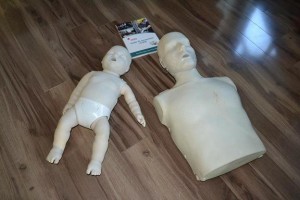
The statistics on heart disease are quite worrying, considering that ischemic heart disease is the leading cause of death in America and the entire world. It kills more than 600,000 Americans annually, with more than half of that being women. Despite these alarming numbers, heart disease and cardiac health awareness still has a long way to go. A large percentage of cardiac arrests still happen outside of the hospital, meaning that people don’t get checked out by their doctor when they first start feeling symptoms.
Cardiac arrest is dangerous because without an adequately beating heart, the rest of our body starts to become deprived oxygen delivery. This can cause multi-organ failure if CPR is not given promptly and correctly. With proper training, you can help save a victim of cardiac arrest; simply giving chest compressions can improve patient outcomes by twice or three times as much.
Basic vs. Advanced CPR
Cardiopulmonary resuscitation (CPR) is one of the easiest lifesaving skills to learn. Even without advanced training, it is possible to give CPR to a victim of cardiac arrest. For rescuers who are not confident in giving CPR completely, chest compression-only CPR will do. If you decide to enroll in a training program with us, you get to choose between basic and advanced CPR classes. However, take not that we mostly tailor our programs for people who work in health care and only have one program available to lay persons.
Basic Life Support
Basic CPR courses teach three basic skills: (1) compression, (2) ventilation, and (3) defibrillation. The first two are the most commonly used in an emergency outside of a healthcare institution or facility. The last is only done if an AED – automated external defibrillator – is available. Basic skills are not meant to complete restore spontaneous circulation of blood in the body, it is meant to stabilize the victim before the EMTs arrive.
We have three BLS courses offered. These programs are approximately four hours long.
- Heartsaver CPR (general public)
- Hearsaver CPR C (health care providers)
- Basic Life Support for HCPs*
*re-certification available
Advanced Life Support
Advanced CPR courses can only be taken by health care professionals who have a valid Basic Life Support for HCPs training credential. These advanced courses just run through the basics and focus more on advanced medical management of cardiac arrest. Medical management covers medication administration and diagnostic examinations – skills that can only be performed by health care professionals.
We have two ALS courses offered. They are both two-day programs, taking between 14 and 16 hours long. Both courses also have re-certification available.
- Advanced Cardiac Life Support
- Pediatric Advanced Life Support
Certification
Certificates expire two years after they are issued. Before they expire, you need to take a re-certification class Re-certification courses are shorter, renewal classes for rescuers with credentials for a particular class. You can only take a re-certification class if your credential has not expired yet. If it has, you cannot qualify for re-certification classes will have to take the training program again.
